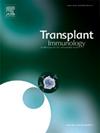Pre-transplant sensitization and its effect on heart transplant rejection and survival outcomes
IF 1.4
4区 医学
Q4 IMMUNOLOGY
引用次数: 0
Abstract
Background
Sensitization of heart transplant (HT) recipients increases the risk of rejection. Assessment of sensitization using a calculated panel reactive antibody (cPRA) is crucial for evaluating transplant compatibility and predicting outcomes. This study investigated the impact of cPRA and pre-existing and de novo Human Leukocyte Antigen (HLA)-donor-specific antibodies (DSAs) on HT outcomes and aimed to identify recipients at a high risk of rejection.
Methods
This retrospective study included 121 adult recipients of HT from a single institution (2014–2023). cPRA values, flow cytometric crossmatches (FCXM), and DSAs were analyzed for their associations with antibody-mediated rejection (AMR) and T cell-mediated rejection (TCMR).
Results
Among the 121 HT recipients, 51.2 % experienced TCMR and 7.4 % experienced AMR. cPRA (I) ≥ 50 % was significantly associated with AMR, pre-existing DSA (pDSA), and positive FCXM. pDSA was present in 16.5 % of HT recipients and correlated with AMR but not mortality. De novo DSAs frequently emerged in 38 % of the recipients following TCMR episodes. Higher cPRA (I) levels correlated with increased rejection risk and shorter AMR-free survival.
Conclusions
High cPRA (≥50 %) significantly predicted the risk of AMR and correlated with pDSA and positive FCXM results. Pre-transplant cPRA assessment is crucial for identifying high-risk recipients and optimizing management strategies to improve HT outcomes.

移植前致敏及其对心脏移植排斥反应和生存结局的影响。
背景:心脏移植(HT)受者的敏感性增加了排斥反应的风险。使用计算的面板反应性抗体(cPRA)评估致敏性对于评估移植相容性和预测结果至关重要。本研究调查了cPRA和预先存在的和新生的人类白细胞抗原(HLA)供体特异性抗体(dsa)对HT结果的影响,旨在识别排斥反应高风险的受体。方法:本回顾性研究包括来自同一机构(2014-2023年)的121名成人HT接受者。分析cPRA值、流式细胞交叉匹配(FCXM)和dsa与抗体介导的排斥反应(AMR)和T细胞介导的排斥反应(TCMR)的关系。结果:121名HT受体中,51.2% %发生TCMR, 7.4% %发生AMR。cPRA (I) ≥ 50 %与AMR、已存在的DSA (pDSA)和FCXM阳性显著相关。16.5% %的HT受体存在pDSA,与AMR相关,但与死亡率无关。在TCMR发作后,38% %的受者经常出现新的dsa。较高的cPRA (I)水平与排斥风险增加和无amr生存期缩短相关。结论:高cPRA(≥50 %)可显著预测AMR风险,并与pDSA和FCXM阳性结果相关。移植前cPRA评估对于识别高风险受体和优化管理策略改善HT结果至关重要。
本文章由计算机程序翻译,如有差异,请以英文原文为准。
求助全文
约1分钟内获得全文
求助全文
来源期刊

Transplant immunology
医学-免疫学
CiteScore
2.10
自引率
13.30%
发文量
198
审稿时长
48 days
期刊介绍:
Transplant Immunology will publish up-to-date information on all aspects of the broad field it encompasses. The journal will be directed at (basic) scientists, tissue typers, transplant physicians and surgeons, and research and data on all immunological aspects of organ-, tissue- and (haematopoietic) stem cell transplantation are of potential interest to the readers of Transplant Immunology. Original papers, Review articles and Hypotheses will be considered for publication and submitted manuscripts will be rapidly peer-reviewed and published. They will be judged on the basis of scientific merit, originality, timeliness and quality.
 求助内容:
求助内容: 应助结果提醒方式:
应助结果提醒方式:


